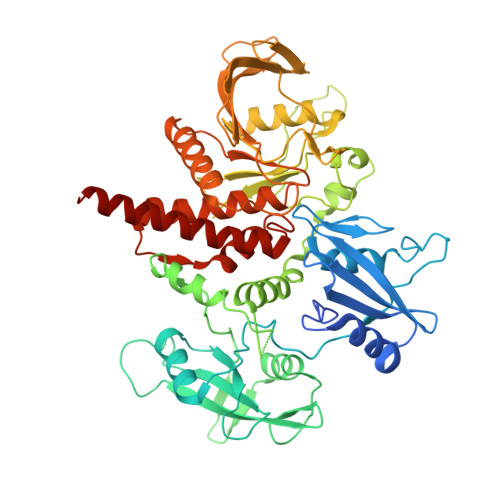Allosteric Inhibitors of SHP2 with Therapeutic Potential for Cancer Treatment.
Xie, J., Si, X., Gu, S., Wang, M., Shen, J., Li, H., Shen, J., Li, D., Fang, Y., Liu, C., Zhu, J.(2017) J Med Chem 60: 10205-10219
- PubMed: 29155585
- DOI: https://doi.org/10.1021/acs.jmedchem.7b01520
- Primary Citation of Related Structures:
5XZR - PubMed Abstract:
SHP2, a cytoplasmic protein-tyrosine phosphatase encoded by the PTPN11 gene, is involved in multiple cell signaling processes including Ras/MAPK and Hippo/YAP pathways. SHP2 has been shown to contribute to the progression of a number of cancer types including leukemia, gastric, and breast cancers. It also regulates T-cell activation by interacting with inhibitory immune checkpoint receptors such as the programmed cell death 1 (PD-1) and B- and T-lymphocyte attenuator (BTLA). Thus, SHP2 inhibitors have drawn great attention by both inhibiting tumor cell proliferation and activating T cell immune responses toward cancer cells. In this study, we report the identification of an allosteric SHP2 inhibitor 1-(4-(6-bromonaphthalen-2-yl)thiazol-2-yl)-4-methylpiperidin-4-amine (23) that locks SHP2 in a closed conformation by binding to the interface of the N-terminal SH2, C-terminal SH2, and phosphatase domains. Compound 23 suppresses MAPK signaling pathway and YAP transcriptional activity and shows antitumor activity in vivo. The results indicate that allosteric inhibition of SHP2 could be a feasible approach for cancer therapy.
- Interdisciplinary Research Center on Biology and Chemistry, Center for Excellence in Molecular Synthesis, Shanghai Institute of Organic Chemistry, Chinese Academy of Sciences , 26 Qiuyue Road, Shanghai 201203, China.
Organizational Affiliation:

















